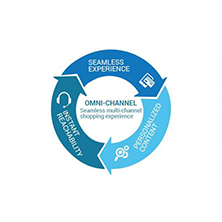Expanding sales beyond the local borders and targeting an international audience offers a great opportunity for retailers. However, it is quite challenging to predict the user behavior when sales expand beyond local borders. Here are some of the major challenges in this space and the possible solutions to address them.
Regional cultures, online purchasing patterns, language barriers and taxation laws make it exponentially more challenging to chase overseas buyers. Analyzing billions of cookie information relating to all the regional aspects and implementing targeted advertising for overseas customers without impacting the customer experience is complex and how retailers tackle this is the key. Targeted advertising using cookies in multi-regional multi-lingual websites are more effective when compared to a centralized ecommerce website. In the long term, the winners would be retailers who are able to leverage Big Data and Machine Learning based Analytics strategies.
Online retailers use data analytics on payment methods to gather intelligence on payment conversion, revenue generation via each payment methods and average order value. The result of this data analytics helps retailers in optimizing their business, provide some targeted offers around payment modes.
Beyond the standard payment options, there are regional preferences like digital wallets, cash on delivery, dynamic PIN authorization etc. These options do not have a common standard and are mostly governed by local regulatory authorities. Yet another critical challenge in using the foreign payments is the FOREX conversion that needs to be dynamically managed by business logic implemented at the website level for multiple geographies.
A clear and present challenge in e-commerce space is cart abandonment. This problem gets further magnified when foreign payments are involved. Real-time Predictive Analytics that marries the customer demographics & behavior with payment options can provide a roadmap to the solution.
Doing business in overseas is always a challenge especially when the rules of the land puts limitations in the form of FDI and local taxation.
Cross border expansion of e-commerce demands retailers to comply with international rules and regulations. In certain countries, the lack of secure infrastructure and legal frameworks to prevent financial crimes can introduce risk to the business itself for the overseas retailers. Countries with a business friendly ecosystem attract more business. Good infrastructure, efficient supply chain, skilled resource, secure technical infrastructure, transparent taxation rules, internet penetration are key among them. However, socio political environment, purchasing potential of the customers and cultural openness are also important, as that it enables higher adoption rates and openness to try something new.
Tips for Online Retailers to get more overseas customers
‘Know your customers intimately’ remains the holy grail for the ecommerce industry. Here the best practices based on our work with ecommerce companies:
- Granular Identification of customer: Combine traffic source from ISPs and identify the path to purchase that the customer followed. Further, if information is available, use zip code based household data to zero in on granular identification of the customer. Use this to do more targeted campaigns and offers.
- Enrich customer profile: Apart from profiling on the basis of demographic, geographic, transactional and behavior, augment this data with customers’ activity & interaction on social platforms.
- Explore dynamic pricing: Assign personalized price based on Segmentation, Loyalty score, price sensitivity analysis and economic value of the local product. Dynamic pricing drives customer satisfaction on one hand while on the other improves ROI for retailers.
- Reimagine the customer experience: Use the mashed up data from above strategies to create regional personas and deliver a real-time immersive customer experience.
Personalization and Actionable Intelligence on the back of Big Data Analytics is the real mantra of success. A robust Structured + Unstructured Data Analytics coupled with a Natural Language Processing (NLP) and machine-learning capabilities form the bed rock for winning in this competitive market.

Salil is a former Happiest Mind and this content was created and published during his tenure.







